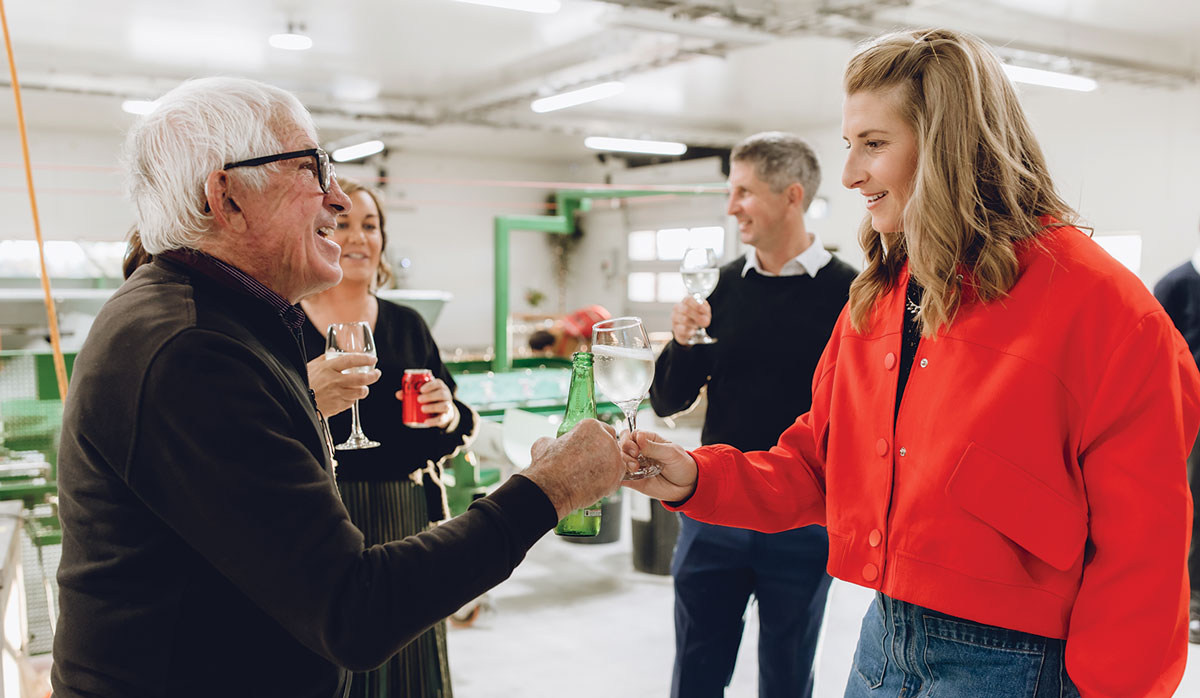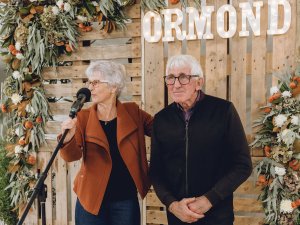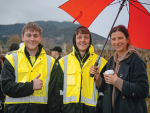Thirty years, 30 million vines and 300 clients later, the founders of Ormond Nurseries say it was a lifechanging decision, despite a $3 million bonfire during the global financial crisis. "It wasn't without its challenges, putting it bluntly," Ben says. "But it's been a wonderful journey."
The Wickhams' bold gamble, hard work and extraordinary contribution to Marlborough's wine industry was recognised at the Marlborough Wine Show in October, with this "powerful duo" awarded a Wine Marlborough Lifetime Achievement award for 2024. That was a "lovely surprise", says Ben. "Especially when it was for both of us."
Ben was studying horticulture at Massey University when he met fellow student and future wife Frances Court, who, it turned out, shared his appetite for a gamble. In 1973 they moved to Nelson, where Ben had a government job as a horticultural advisory officer, before they set off for a year's travel, including six weeks picking grapes in Australia. When they returned in 1975, ready for a risk, they sold their Nelson house and bought an 8-hectare block of land in Ormond, Gisborne. It had no power, poor drainage and issues with water quality, but Ben dug in, quite literally, while Frances continued her work as a teacher. He is "a man of action", says Frances nearly 50 years on, talking of how Ben's blind faith changed their life course, "from very, very humble beginnings" to founders of one of the country's leading grapevine nurseries. The gratitude goes both ways, with Ben reflecting on the mammoth role Frances has played in keeping the family and business on an even keel over the past half century. "Without her I'd be history."
Their son Marcus, speaking at the May launch of a new Ormond Nurseries production facility in Marlborough, says the company's genesis was in market gardening, with sweet corn, pumpkins and other vegetables sold at the local market. Irrigation changed the outlook, and Ben began grafting kiwifruit vines, including for their own block, as well as propagating persimmons, citrus, nashi and feijoas, along with strawberries and vegetables. "The nursery became quite a big part of the business," Marcus says. "In 1977 the neighbours started planting grapevines and one of them suggested that Dad try grafting grapes." Phylloxera was raising its head in Gisborne, "devastating vineyards", and growers were busy sourcing vines grafted on American rootstocks with resistance to the root-chewing aphid. German wine expert Helmut Becker was visiting New Zealand at the time, and was a fount of knowledge when it came to "all things rootstock and grafting techniques", Marcus says. "That was a real turning point for the company."
But there were plenty of ongoing challenges, including Cyclone Bola in March 1988, which flooded the property, decimated that year’s crop, and went on to slowly kill the Wickham’s kiwifruit vines. So when Marlborough Research Centre (MRC) Executive Officer Gerald Hope called Ben in the early 1990s, urging him to consider moving to Marlborough, the “man of action” was open to the idea. Demand for phylloxera resistant vines had been ramping up in Marlborough, the MRC had some land for lease, and its neighbours at Rowley Crescent had a block available for sale. Gerald helped the Wickhams “join the dots” and Ben came down to check out the site, Marcus says. “Dad turned up, dug one hole, then turned the tap on, had a drink out of the hose, and immediately agreed to buy the block.” That kind of purchase would typically require multiple holes and chemical analysis of soils and water. “Not Dad – he dug the hole, drank the water and pulled the trigger.” Having battled high clay soils, poor drainage and bad water on the Ormond block, “this was like heaven for him”, Marcus says. “It was an easy decision.”
These days wine is a $2.4 billion industry in New Zealand, with Marlborough’s 30,000ha producing more than 80% of the national harvest. But Gerald, speaking at the opening of the new facility, noted that grapes were a relatively small industry at that time, with 280ha of vineyard in Marlborough and $62m in revenue, putting it second to sheep as a regional earner. But it had clear potential. In January 1995 the Wickhams and their four children arrived in Blenheim, where “crazy” levels of orders saw the team grow, along with the complexity of the operation. There was no pocket money for the kids but plenty of work, Marcus says. “They said, ‘if you want to work, we’ll pay you, and if you want to work like an adult, you’ll get paid like one.’”
Over the next 15 years, industry growth surged and the number of grapevine nurseries in New Zealand ballooned to around 35, all competing for a share of the market. "It was a wild ride and it all came to a screeching halt around 2008, 2009," Marcus says. "That was when the industry hit an oversupply at the same time as the global financial crisis. It was a pretty tough time." In 2010 Ormond Nurseries had what they refer to as "the $3 million bonfire", sacrificing the vines they could not sell. Many nurseries closed down and the Wickhams struggled to keep their doors open, Marcus says. "It was only sheer grim determination from Mum and Dad and Lorna [Lindquist, nursery supervisor] that they kept things going."
Frances says in the midst of the GFC "when things were looking absolutely grim", Marcus and his wife Samantha joined the business, securing its future. "If they hadn't come on board, we definitely wouldn't be here... Marcus helped us get through some difficult decisions in that very difficult time." Ben puts the endurance of the company down to the network of family and staff, calling himself a "cog" in something far greater. "Without the staff and family involved, we would have nothing."
Marcus had been busy travelling with his Klima automated cane pruning technology, and wanted to spend more time at home with his very young family. Meanwhile his youngest sister Susie, who had spent 10 years with Lion Nathan as a management accountant, also stepped in to help – initially alongside her day job, then fulltime as the Chief Financial Officer. They knew the business, “built from scratch”, was a large part of Ben’s identity, Marcus says. “It was pretty hard, particularly for Dad, to see it either shut down or turned into another vineyard or sold.” But he admits it was a massive undertaking to take it on. “It’s a pretty big biological beast.” There are myriad variables in the nursery business, and a good reason why there are only three or four nurseries left in New Zealand. “I knew Mum and Dad had been to hell and back with the company, but I had no idea what was actually involved and the decisions that had to be made.”
Sales began to pick up in 2013, and Ormond Nurseries was dragged “back from the brink of extinction”, says Marcus, who stepped up to General Manager when Ben decided to step down from that role in 2019. The same year Ormond Nurseries bought Villa Maria’s Vineyard Plants nursery in Hawke’s Bay, as well as Vine Test Lab, which it sold on to Hill Laboratories in 2020. The nursery purchase, which came with orders but not supply, led to a “purple patch” of demand that the company has worked hard to backfill. They also took on the customers, as best they could, of the highly regarded Auckland nursery Misty Valley when it closed, “which was another hole to fill”.
 |
|---|
|
Ben and Susie Wickham at the opening of Ormond Nurseries’ new facility. Photo Credit: Lisa Duncan
|
Now they are focusing on delivering good value to customers, with a great deal of investment in “the back-room stuff ” of automation, efficiency and vine health, Marcus says. The latest development, built on 30ha of neighbouring land purchased in March, is a continuation of Ben’s bullish trajectory and Marcus and Susie’s future focus. The Glenmore Farm acquisition – purchased after Ben’s dig-a-hole-and-drink- the-water test passed with flying colours – provides more space for grapevine propagation, and a production facility that amps up the operation’s biosecurity safety and efficiency, and is prepared for future automation.
It’s a long way from growing veges in Gisborne, Ben says, noting that he and Frances are stronger for all the challenges they have faced together. “In hindsight it’s the best thing we have ever done.”
Growing Biosecurity
New Zealand’s wine industry has to be prepared for the Covid-19 of vines, says Ormond Nurseries General Manager Marcus Wickham from the company’s new Marlborough production facility. Opened near Ormond’s existing operations, the new site is safeguarded for day-to-day activities, but also for the potential incursion of an industry-threatening pathogen or pest. Marcus says Ormond Nurseries joined New Zealand Plant Producers Incorporated (NZPPI) in 2015, in what was a wakeup call to the risks nurseries pose to biosecurity, as well as the opportunity they have to help protect the industry. It was an “awkward realisation” that led the company to undertake major changes to stay viable and meet its obligations, he says. “We really wanted to be an asset to the country, to the industry and the community, and not a liability when something goes wrong.”
The new facility allows them to control traffic, supply vehicles and people coming on and off the site, and creates an “unbroken quarantine” for vines, from the day they are grafted to the day they are delivered. “That allows us to exceed our biosecurity obligations with MPI by quite some considerable way.” The new facility has also improved staff safety, including forklift free zones, and is future proofed for nursery automation. “In many ways this site removes those kinds of invisible anchor chains that have been holding us back,” Marcus says. “We’ve built this facility after almost 50 years of grafting grapevines with the view that we wanted to set the business up to service customers better for the next 50 years. And we can’t wait to get started.”















